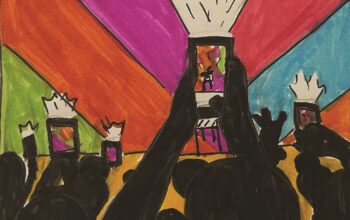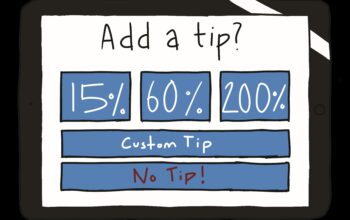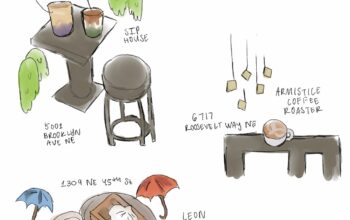
In this paper, you will find articles about people striving to change institutions. A feature article takes stock of the work Roosevelt is doing, plans to do, and has yet to do to confront racism in our school. Another examines what can be done to improve our system of reporting sexual assault and harassment incidents, and who is doing that work. In the news section, you will find the story of how students and their activism have evolved over the past year. In the Opinion section, you will read student thoughts on the BLM lessons introduced this year, and in the Sports section, a reflection on disparities in the NCAA.
A common theme in this first and final print issue is change. Not just change as a concept or an aspiration, but the messy nuts and bolts realities of what it takes for a system to change.
Part of institutional change requires each of us to reflect on the role we play in enabling oppression. That introspection is not comfortable. A continuous re-examination of ourselves requires questioning our beliefs about justice, success, equality, and goodness.
If you find introspection hard, you are not alone. In fact, there is a name for it. French and West Indian psychoanalyst and social philosopher Frantz Fanon wrote in his book Black Skin, White Masks, “Sometimes people hold a core belief that is very strong. When they are presented with evidence that works against that belief, the new evidence cannot be accepted. It would create a feeling that is extremely uncomfortable, called cognitive dissonance. And because it is so important to protect the core belief, they will rationalize, ignore and even deny anything that doesn’t fit the core belief.”
Sometimes, refusing to accept reality only has consequences for yourself. Like smoking when you know it is bad for you. But other times when we refuse to confront conflict, we allow systems of oppression to continue.
Much of the country, specifically white Americans, have experienced dissonance this past year as structural racism in policing has clashed with preconceptions of police as solely good. A Pew Research poll in 2016 found that white Americans are far more likely than Latino Americans and Black Americans to believe that police are racially impartial. This core belief held by the majority of white Americans comes in part from our country’s de facto segregation persisting after a history of legalized redlining and segregation. In short, many white Americans only see how police act in white-dominated spaces.
This belief held by the majority of white Americans conflicts with overwhelming statistical and anecdotal evidence that police serve various populations differently. Yet, core beliefs in the fairness of our justice system conflict with the message activists are calling on us to understand: that the prison industrial complex, despite a long history of reform, is inherently violent and disproportionately murders and imprisons Black, brown, poor, and disabled people.
We need to dive headfirst into this dissonance because people are dying as a result of our insistence on inadequate reforms. The George Floyd Justice in Policing Act, as lawyer and columnist Derecka Purnell argues, would not have even saved George Floyd’s life. We have to question our own definitions of justice in order to imagine more than too-timid reforms.
Diving into dissonance is easier said than done. Our reaction to facts that seems to threaten our goodness is especially painful. Shame, guilt, and fear are physically sickening feelings. Because of this, our brains will subconsciously try to avoid the discomfort dissonance.
While these rationalizations and denials may relieve discomfort, they also inhibit learning, critical consciousness, and action, which are all fundamental to allyship. One way to open to change is to be aware of the urge to be defensive, and bring curiosity to our own internal processes. Building up this tolerance for discomfort means we ask ourselves, what does the discomfort physically feel like? How am I reacting to this new information? Am I rejecting it? Rationalizing? Trivializing? Seeking distractions or changing the subject?
Awareness of discomfort is essential to a critical aspect of allyship: listening. Tolerance for discomfort when listening to someone who is presenting information you have not heard is necessary to receiving feedback about yourself or an institution you live in.
To the white people in the Roosevelt community– as we live our lives taking action to dismantle systems of oppression, we will go through uncomfortable experiences like realizing mistakes and having core beliefs challenged. When confronted with those stumblings, awareness of our internal reactions can keep us from freezing and keep us on the path of striving towards a reimagined future.
The next time our certainty is threatened in our world of conflicting truths, I encourage us to pause, slow down, and open our hearts and minds to dissonance.



